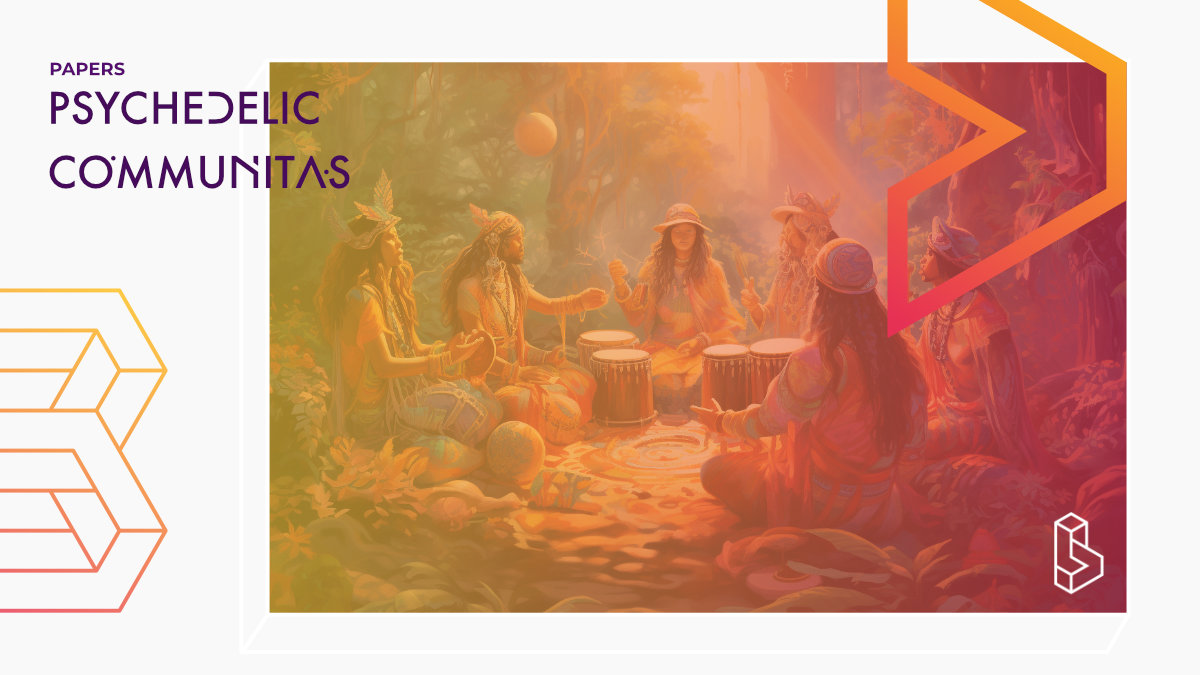This prospective survey study (n=886) of those participating in a psychedelic ceremony validated the adapted Communitas Scale and found that positive interpersonal experiences (including personal sharing) correlated with positive outcomes (psychological well-being & social connectedness).
Abstract of Psychedelic Communitas
“Background. Recent years have seen a resurgence of research on the potential of psychedelic substances to treat addictive and mood disorders. Historically and contemporarily, psychedelic studies have emphasised the importance of contextual elements (‘set and setting’) in modulating acute drug effects, and ultimately, influencing long-term outcomes. Nevertheless, current small-scale clinical and laboratory studies have tended to bypass a ubiquitous contextual feature of naturalistic psychedelic use: its social dimension. This study introduces and psychometrically validates an adapted Communitas Scale, assessing acute relational experiences of perceived togetherness and shared humanity, in order to investigate psychosocial mechanisms pertinent to psychedelic ceremonies and retreats.
Methods. In this observational, web-based survey study, participants (N = 886) were measured across five successive time-points: 2 weeks before, hours before, and the day after a psychedelic ceremony; as well as the day after, and 4 weeks after leaving the ceremony location. Demographics, psychological traits and state variables were assessed pre-ceremony, in addition to changes in psychological wellbeing and social connectedness from before to after the retreat, as primary outcomes. Using correlational and multiple regression (path) analyses, predictive relationships between psychosocial ‘set and setting’ variables, communitas, and long-term outcomes were explored.
Results. The adapted Communitas Scale demonstrated substantial internal consistency (Cronbach’s alpha = 0.92) and construct validity in comparison with validated measures of intra-subjective (visual, mystical, challenging experiences questionnaires) and inter-subjective (perceived emotional synchrony, identity fusion) experiences. Furthermore, communitas during ceremony was significantly correlated with increases in psychological wellbeing (r = 0.22), social connectedness (r = 0.25), and other salient mental health outcomes. Path analyses revealed that the effect of ceremony-communitas on long-term outcomes was fully mediated by communitas experienced in reference to the retreat overall, and that the extent of personal sharing or ‘self-disclosure’ contributed to this process. A positive relationship between participants and facilitators, and the perceived impact of emotional support, facilitated the emergence of communitas.
Conclusions. Highlighting the importance of intersubjective experience, rapport, and emotional support for long-term outcomes of psychedelic use, this first quantitative examination of psychosocial factors in guided psychedelic settings is a significant step towards evidence-based benefit-maximisation guidelines for collective psychedelic use.“
Authors: Hannes S. Kettner, Fernando Rosas, Christopher Timmermann, Laura Kärtner, Robin L. Carhart-Harris & Leor Roseman
Summary of Psychedelic Communitas
The biomedical revolution of the 1970s and 80s led to an explosive infiltration of pharmaceutical interventions into psychiatric practice and the marginalization of previously favored psychodynamic approaches. Psychedelic-assisted psychotherapy research has remained largely silent in relation to the social dimension of psychedelic use.
Psychedelic substances have a socially constructive function in many cultures, and this function is reflected in the plethora of approaches to psychedelic use that persist in contemporary Western cultures, including dance-events (“raves”), religious ceremonies conducted by ayahuasca churches, and medically supervised administration of ibogaine in underground addiction treatment centres.
Notes
The participants (n=886) in this study participated in a psychedelic retreat/ceremony with classical psychedelics. Participants filled in surveys before (prospective; 2 weeks and some hours before) and after the psychedelic experience (that same day, day later, 4 weeks later).
Most of the experiences were with mushrooms/truffles (80%) or ayahuasca (16%).
This study validated the Communitas Scale (COMS) and showed that this scale had significant (but weak) predictive power on (positive) outcome measures.
The final model (figure 6, which graphically explains it much better than the following) shows how rapport (harmonious relationship) before the session, predicts the ‘ceremony communitas’ during the psychedelic session and perceived emotional support (which also predicts ceremony communitas). This in turn predicts retreat communitas and self-disclosure as measured after the retreat. Retreat communitas then predicts (albeit weakly) psychological well-being and social connectedness.
This study adds a big data point to the study of psychedelics in their commonly used setting, in a group, and in a retreat of some sort. The setting (and probably also the mindset) are quite different from that of clinical studies where one is usually alone. In those cases, there is a distinct lack of communitas (aside from the therapeutic alliance).
Compared to other studies (e.g. Roseman et al., 2019), this one found large effects on mental health outcomes. The difference was that the sessions were guided here, which offers another reference for the value of using ceremony/guided environments.
Find this paper
https://doi.org/10.3389/fphar.2021.623985
Open Access | Google Scholar | Backup | 🕊
Cite this paper (APA)
Kettner, H., Rosas, F. E., Timmermann, C., Kärtner, L., Carhart-Harris, R. L., & Roseman, L. (2021). Psychedelic communitas: intersubjective experience during psychedelic group sessions predicts enduring changes in psychological wellbeing and social connectedness. Frontiers in Pharmacology, 234.
Authors
Authors associated with this publication with profiles on Blossom
Chris TimmermannChris Timmerman is a postdoc at Imperial College London. His research is mostly focussed on DMT.
Robin Carhart-Harris
Dr. Robin Carhart-Harris is the Founding Director of the Neuroscape Psychedelics Division at UCSF. Previously he led the Psychedelic group at Imperial College London.
Leor Roseman
Leor Roseman is a researcher at the Centre for Psychedelic Research, Imperial College London. His work focussed on psilocybin for depression, but is now related to peace-building through psychedelics.
Linked Research Papers
Notable research papers that build on or are influenced by this paper
Enhanced meaning in life following psychedelic use: converging evidence from controlled and naturalistic studiesThis mixed-methods analysis (n=973 across multiple cohorts) examines how psychedelic experiences influence “meaning in life” using the Meaning in Life Questionnaire (MLQ) across three contexts: a psilocybin clinical trial for depression, a single-arm healthy volunteer study, and a naturalistic retreat-based study. It finds strong increases in the “presence of meaning” subscale and modest decreases in “search for meaning,” with enhancements linked to improvements in mental health and to the intensity of mystical, ego-dissolution, and emotional breakthrough experiences.

